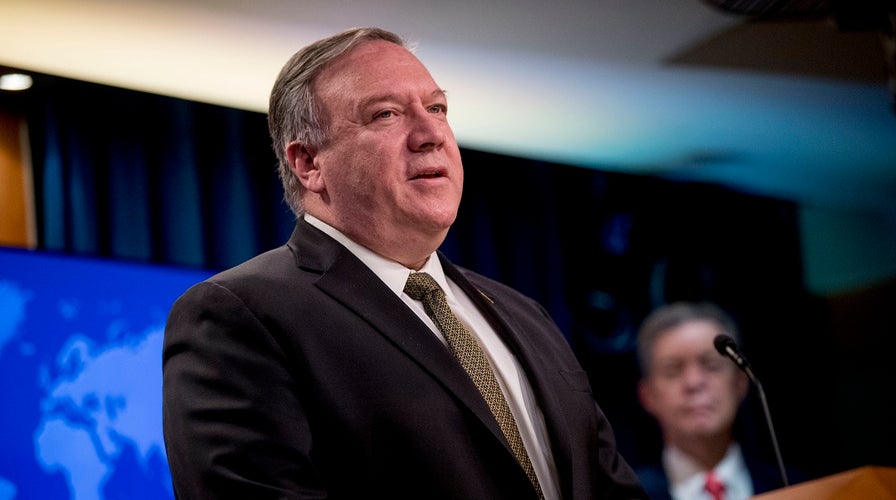Fox News Flash top headlines for June 19
Fox News Flash top headlines are here. Check out what's clicking on Foxnews.com.
Secretary of State Mike Pompeo on Saturday criticized the U.N. Human Rights Council, after the controversial organization passed a resolution criticizing the state of policing and race in the U.S. -- even as it is accused of ignoring egregious human rights violations from those on the council itself.
“The United Nations Human Rights Council, now comprised of Venezuela and recently, Cuba and China, has long been and remains a haven for dictators and democracies that indulge them,” Pompeo said in a statement. “It is a grave disappointment to those genuinely seeking to advance human dignity. Even so, the Council’s decision to vote yesterday on a resolution focusing on policing and race in the United States marks a new low.”
CHINA JOINS UN HUMAN RIGHTS COUNCIL PANEL DESPITE TROUBLING RECORD, RESPONSE TO CORONAVIRUS
The Council, which the U.S. left in 2018 over concerns over both its membership and its anti-Israel bias, passed by unanimous consent on Friday a resolution on the “promotion and protection of the human rights and fundamental freedoms of Africans and of people of African descent against police brutality and other violations of human rights.”
The resolution, which was drafted by Iran, Burkina Faso and the “State of Palestine” expresses concern about the “continuing racially discriminatory and violent practices perpetrated by law enforcement agencies against Africans and people of African descent, and the structural racism endemic to the criminal justice system in the United States of America and other parts of the world recently affected."
It comes in response to the death of George Floyd in police custody in Minneapolis. His death, and video which shows a police officer with his knee on Floyd’s neck, sparked protests and riots in the U.S. and other countries.
The Council held a meeting earlier in the week, where members spoke out against racism and police brutality, some choosing not to mention the U.S. by name. Floyd's brother, Philonise, spoke at the meeting. However, it was also a platform for anti-American rhetoric, with Venezuela --- a country dogged by human rights abuses and economic ruin -- decrying “Yankee imperialism.”
VENEZUELA TAKES SEAT ON UN HUMAN RIGHTS COUNCIL OVER US OBJECTIONS
The resolution goes on to express “alarm at the recent incidents of police brutality against peaceful demonstrators defending the rights of Africans and of people of African descent” and calls for an international commission of inquiry, and for the U.S. and other countries to cooperate.
But the resolution serves as proof for critics of the Council that it is more focused on U.S. matters that broader and more serious human rights issues in other countries, including those that sit on the council.
Along with Venezuela, the current council members include Afghanistan, Somalia, Eritrea and Libya. Hillel Neuer, executive director of U.N. Watch, noted that the council’s sessions produced no resolution on China, despite the persecution of Muslims and the silencing of coronavirus whistleblowers.
In his statement, Pompeo said that the ongoing discourse about Floyd’s death is a sign of U.S. democracy’s strength and maturity.
“Americans work through difficult societal problems openly, knowing their freedoms are protected by the Constitution and a strong rule of law. We are serious about holding individuals and institutions accountable, and our democracy allows us to do so,” he said. “The United States works every day with partners around the world who share our commitment to fundamental freedoms.”
CLICK HERE TO GET THE FOX NEWS APP
He went on to say that the Council’s move reaffirmed the U.S. decision to withdraw.
“If the Council were serious about protecting human rights, there are plenty of legitimate needs for its attention, such as the systemic racial disparities in places like Cuba, China, and Iran,” he said.”If the Council were honest, it would recognize the strengths of American democracy and urge authoritarian regimes around the world to model American democracy and to hold their nations to the same high standards of accountability and transparency that we Americans apply to ourselves.”














































